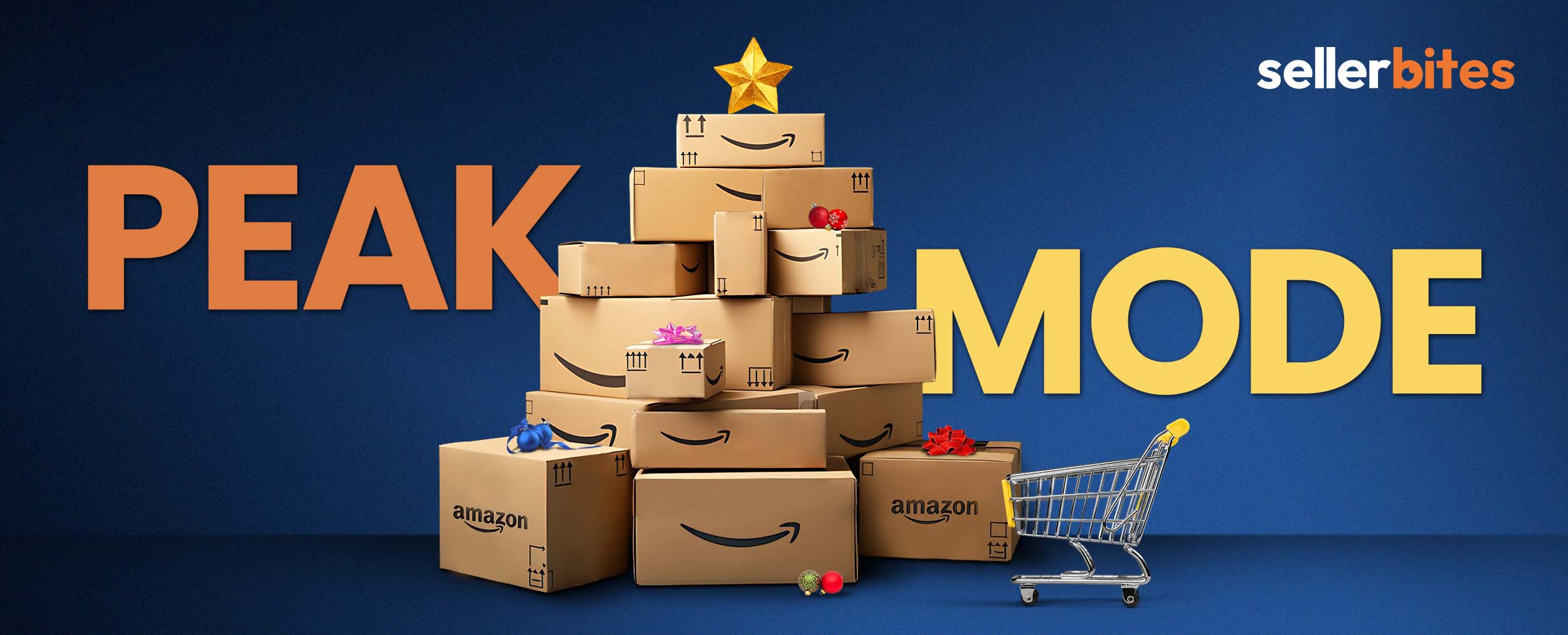Conan O’Brien took some big swings at Jeff Bezos at the 97th Academy Awards—from Amazon’s delivery mishaps to its $1B James Bond deal, no joke was off-limits, and viewers had opinions.
But Amazon itself is making headlines for more than just late-night jokes. Here’s what’s making waves today:
- A return scam is costing Amazon sellers millions 💸
- Amazon hit with a $39M fine over “fake” luxury goods ⚖️
- Temu’s latest move puts even more pressure on Amazon 🚀
- Amazon’s AI shift is changing the game for sellers 🤖

BLACK MARKET
A former Amazon seller went viral on TikTok after exposing how some buyers exploit return policies to get free products.
TwistedSifter reported that the viral video revealed a harsh truth: when return policies favor customers too much, sellers are left footing the bill. 💸
📉 The return scam that drained her business
The seller (OP) ran a phone case business, designing and licensing her own unique styles. She handled everything—from manufacturing to shipping—and used Amazon’s fulfillment service (FBA) to store and ship her products.
At first, everything ran smoothly—until some buyers found a loophole. Here’s how the scam worked:
- A buyer would request a return, selecting a generic reason like “didn’t like the product.”
- OP had to pay Amazon to have the item shipped back to her.
- Instead of returning the brand-new case, the buyer would send back an old, used one. 📦
- Amazon accepted the return with no verification and automatically refunded the buyer.
- OP was left with a worthless product, out of money, and with no way to fight back.
🚪 No way to fight back
With no real appeal process, OP had two choices: accept the losses or walk away. And the damage wasn’t just financial—her seller rating took a hit every time this happened, making it even harder to stay competitive.
For many third-party sellers, this is an all-too-familiar struggle. Amazon’s buyer-first approach comes at a cost, and with no safeguards against return fraud, some sellers are questioning if it’s worth staying on the platform.
What do you think? Should Amazon do more to protect its sellers? 💬

TOGETHER WITH WALMART MARKETPLACE
The secret to maximizing your ecommerce savings

Build, grow, and elevate your eCommerce business with one of the most trusted names in retail.
Sell your products on Walmart.com Designed with sellers in mind, Walmart Marketplace is one of the fastest-growing eCommerce platforms in the U.S. You'll pay zero setup, monthly, or closing fees and our competitive commission and fulfillment fees mean better margins for your bottom line.
Walmart Marketplace sellers get access to:
🔵 a network of millions of customers
🔵 innovative programs that help you scale
🔵 Walmart’s omnichannel advantage
It takes just a few steps to start selling and right now.
New-Seller Savings is back and bigger than ever.
*Incentives totalling up to $75K
* More time to reach maximum savings.
*Conditions apply.

BITES OF THE WEEK
- Sponsored Searches: Consumer advocacy group Consumers' Checkbook discovered approximately half of Amazon search results are sponsored content!
- Lawsuit Over Deliveries: Slater Vecchio LLP law firm is seeking approval to launch a class-action lawsuit against Amazon for not honoring Prime Delivery promise.
- Amazon Goes Quantum: Amazon Web Services first-gen quantum computing chip, Ocelot, can reduce the costs of implementing quantum error correction by up to 90%.
- Webinar Alerts: Amazon's back with their free, live webinars on March 4, 5, and 6.

HOT TOPIC
Amazon fined $39M for selling "fake" Beverly Hills Polo Club products

Amazon is no stranger to legal battles, but its latest courtroom loss in India is making waves.
According to Khaleej Times, a Delhi High Court has ordered the ecommerce giant to pay $39 million in damages for trademark infringement involving the Beverly Hills Polo Club (BHPC) brand.
And let’s just say—it’s a big deal.
🚨 The case that sparked it all
Back in 2020, Lifestyle Equities, the company behind the BHPC trademark, noticed something off. Their signature horse logo was appearing on apparel sold on Amazon India—but these weren’t official BHPC products. 🐎
Instead, the listings featured nearly identical branding at much lower prices.
⚖️ The verdict and its impact
After a lengthy legal fight, the court ruled in favor of Lifestyle Equities, citing major red flags:
- The infringing brand was owned by Amazon Technologies and sold directly on Amazon India.
- The logos were “hardly distinguishable,” with the court providing side-by-side comparisons.
- Amazon had already faced trademark disputes over BHPC in other countries, including the UK. 🌍
🔎 A bigger pattern?
This isn’t just another legal hiccup—it's a landmark ruling in India. Lawyers say the $39M penalty is one of the highest ever awarded in a trademark case involving a U.S. company. It also fuels ongoing concerns about Amazon’s role in policing its own marketplace.
And let’s not forget—this isn’t Amazon’s first brush with controversy in India:
- A 2021 investigation alleged Amazon created knockoff products and manipulated search results to favor its own brands. 🛑
- India’s antitrust watchdog has accused Amazon of giving preferential treatment to select sellers—claims Amazon denies.
With this latest court decision, Amazon faces even more scrutiny in India and beyond. The big question now? How will U.S. courts respond, and what’s next in Amazon’s global trademark battles?

ECOMMERCE NEWS
Temu makes its boldest move yet to challenge Amazon

Temu is steering the whole ship in a new direction. According to NewsBreak, Temu is making major operational changes—both locally and internationally.
The goal? A stronger foothold in the U.S. market, and—let’s be honest—a bigger piece of Amazon’s pie. 🥧
🚚 What’s changing?
- Less control, more flexibility. Temu used to handle pricing, shipping, and marketing for merchants. Now, it’s stepping back, focusing solely on managing the platform.
- The 'half-custody' model. Sellers are encouraged to ship goods in bulk to U.S. warehouses. Those who do get priority, with “local” badge listings getting extra promotion.
- More categories, bigger competition. With inventory stored in the U.S., Temu can expand into bulkier product categories like furniture, fitness equipment, and even food. In short, it’s creeping further into Amazon’s territory. 🛋️
⚔️ What it means for sellers
- Higher costs for China-based sellers. Losing the de minimis exemption and facing new tariffs, sellers must now cover shipping costs, likely pushing prices higher.
- An advantage for U.S. sellers. Those with local inventory stand to gain as Temu shifts toward prioritizing domestic fulfillment.g
Temu is playing the long game, and while it’s still known for bargain-bin prices, this shift suggests it has bigger ambitions. One thing’s certain—the battle for ecommerce dominance is far from over. 🛒

TECH MARKETING
Why shouldn't you ignore Amazon's AI shift

Amazon is pushing AI deeper into its ecosystem, and sellers who don’t adapt risk getting left in the dust. Reporteros del Sur breaks down what’s changing and how you can stay ahead. 📈
- AI search is redefining product discovery. Shoppers aren’t just searching anymore—they’re asking. With Rufus, Amazon’s AI assistant, product recommendations are more tailored than ever. 🔍
- Tip: Optimize listings with conversational, AI-friendly keywords.
- AI-powered ads are taking over. Amazon’s predictive analytics are placing ads in front of the right buyers at the right time—automatically. Manual ad strategies won’t cut it for long.
- Tip: Test Amazon’s AI ad tools before they become the standard.
- Smarter inventory management = bigger profits. AI-powered forecasting is reshaping inventory strategies, reducing stockouts, and cutting down storage fees. 💰
- Tip: Align your inventory strategy with Amazon’s predictive models.
🚀Amazon is setting the pace in AI. The only question is—are you moving fast enough to keep up?








